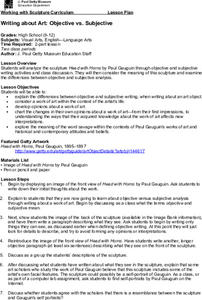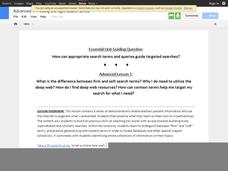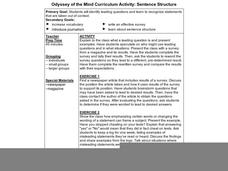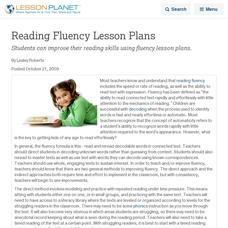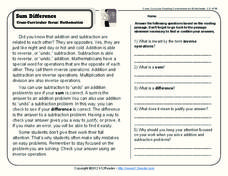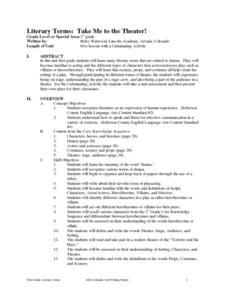Curated OER
What Are the Advantages and Disadvantages of Conforming?
Dive into Arthur Miller’s The Crucible and determine what it means to conform in society, and discuss as a group with the thoughts and plans available in these documents. Included are multiple activities and brain targets that form the...
Curated OER
Alphabet Poems
Develop fluency with a variety of works. Help kindergartners use multiple strategies to understand text and decoding. They will create an alphabet poem book on Kid Works 2 to illustrate and write their own poem. In the end, they will...
Curated OER
Writing About Art: Subjective vs. Objective
Explore objective and subjective writing in this interdisciplinary instructional activity, which brings language arts and visual art together. Middle and high school learners examine the sculpture Head with Horns by Paul Gauguin. They...
Google
Advanced 1: Picking the Right Search Terms
Many people, when searching online, will type in what they are looking for without much thought. But what's the next step, if they don't get the desired results? Careful selection of search terms. Your class can develop a sense for...
Odyssey of the Mind
Odyssey of the Mind Curriculum Activity: Sentence Structure
Statements can be taken out of context and interpreted or used to support a very different view than the one originally intended. Young journalists start thinking about leading questions, sentence structure, context, and how they all...
Curated OER
Homophones
Pare, pair, or pear? Learners explore homophones with this dictionary skills worksheet. They look up definitions to five sets of homophones to see how words can sound the same but have completely different meanings. There are plenty of...
Curated OER
The Adventures of Tom Sawyer: Magic Square Vocabulary
Before getting too far into The Adventures of Tom Sawyer, support your learners by introducing and practicing some vocabulary that might be unfamiliar to them. The vocabulary exercise here includes 16 words from the third and fourth...
Core Task Project
Whatif by Shel Silverstein
What a skillful way to incorporate Shel Silverstein, a wonderful author, into the classroom. Composed of three tasks, children are led through a series of text-dependent questions that force them to unveil the meaning of Silverstein's...
Noyce Foundation
Sewing
Sew up your unit on operations with decimals using this assessment task. Young mathematicians use given rules to determine the amount of fabric they need to sew a pair of pants. They must also fill in a partially complete bill for...
National Endowment for the Humanities
Jacob Lawrence's Migration Series: Removing the Mask
Describe, analyze, compare and contrast poets from the Harlem Renaissance. Critical thinkers analyze the imagery, characterization, tone, symbolism, and historical context of Jacob Lawrence, Helene Johnson, and Paul Laurence Dunbar. A...
Statistics Education Web
It’s Elemental! Sampling from the Periodic Table
How random is random? Demonstrate the different random sampling methods using a hands-on activity. Pupils use various sampling techniques to choose a random sample of elements from the periodic table. They use the different samples to...
Google
Intermediate 3: Narrowing a Search to Get the Best Results
Examine advanced filters and operators in depth. Class members try out even more filtering tools than they did in the beginning lesson and practice with operators, special symbols or words that affect search results, recognized by...
Curated OER
Verb Tenses
Discover how to use proper verb tenses with context clues. Five sentences help first graders decide if they should use -ed or -ing to end simple verbs. Each sentence provides context clues to indicate the time. Use the resource in...
Curated OER
Homophones: Fun with Puns
What is a homophone for aloud? Or right? Fifth graders complete a list of 24 homophones, choosing another word that sounds like a given word but has a different meaning. At the bottom of the page, they write punning sentences to practice...
Curated OER
Reading Fluency Lesson Plans
Learn the basics behind teaching reading fluency. With descriptions of both direct and indirect fluency instruction and practice, this article also includes a few lessons teachers can put to use in their classroom today.
Inside Mathematics
Quadratic (2009)
Functions require an input in order to get an output, which explains why the answer always has at least two parts. After only three multi-part questions, the teacher can analyze pupils' strengths and weaknesses when it comes to quadratic...
Curated OER
Dandelion Wine: Socratic Seminar
There are “a million things to talk about. . .” in Ray Bradbury’s Dandelion Wine; however, the focus of this socratic seminar is the issue of living and dying. Class members prepare for the discussion by writing about their own views of...
Curated OER
Freedom by the Fireside: The Legacy of FDR's "Four Freedoms" Speech
Students read and analyze Franklin Delano Roosevelt's 1941 State of the Union Address. They listen to recordings of speeches by F.D.R., answer discussion questions, and participate in a debate.
K12 Reader
Sum Difference
If you need a way to address math and reading in one lesson, look no further than a passage about inverse operations, complete with reading comprehension questions. Kids focus on context clues to determine the meanings of unfamiliar words.
EngageNY
Comparing Linear and Exponential Models Again
Making connections between a function, table, graph, and context is an essential skill in mathematics. Focused on comparing linear and exponential relationships in all these aspects, this resource equips pupils to recognize and interpret...
EngageNY
Creating Division Stories
Create your own adventure story ... well, not really. The fifth lesson in a 21-part series has pairs create story contexts for division problems. The lesson presents a step-by-step process for pupils to follow in writing such stories.
Curated OER
Literary Terms: Take Me to the Theater!
Take your class to the theater! First graders will examine characters that actors play such a villians and heroes. Then participate in creating plays and performing in them. They will also research what it takes to create scenery, props...
Curated OER
Move It!!!
Students explore motion by observing the movement of people and duplicating those movements. They compare and contrast various kinds of movements and identify different types of movements in pictures. They build an object that can be...
Southern Nevada Regional Professional Development Program
Poetry Aloud/Poetry Out Loud
To appreciate the value of seeing and hearing a poetry performance, groups prepare readings of selected poems and then compare and critique their interpretations and videotaped versions of the same poem. Included in the resource are...




